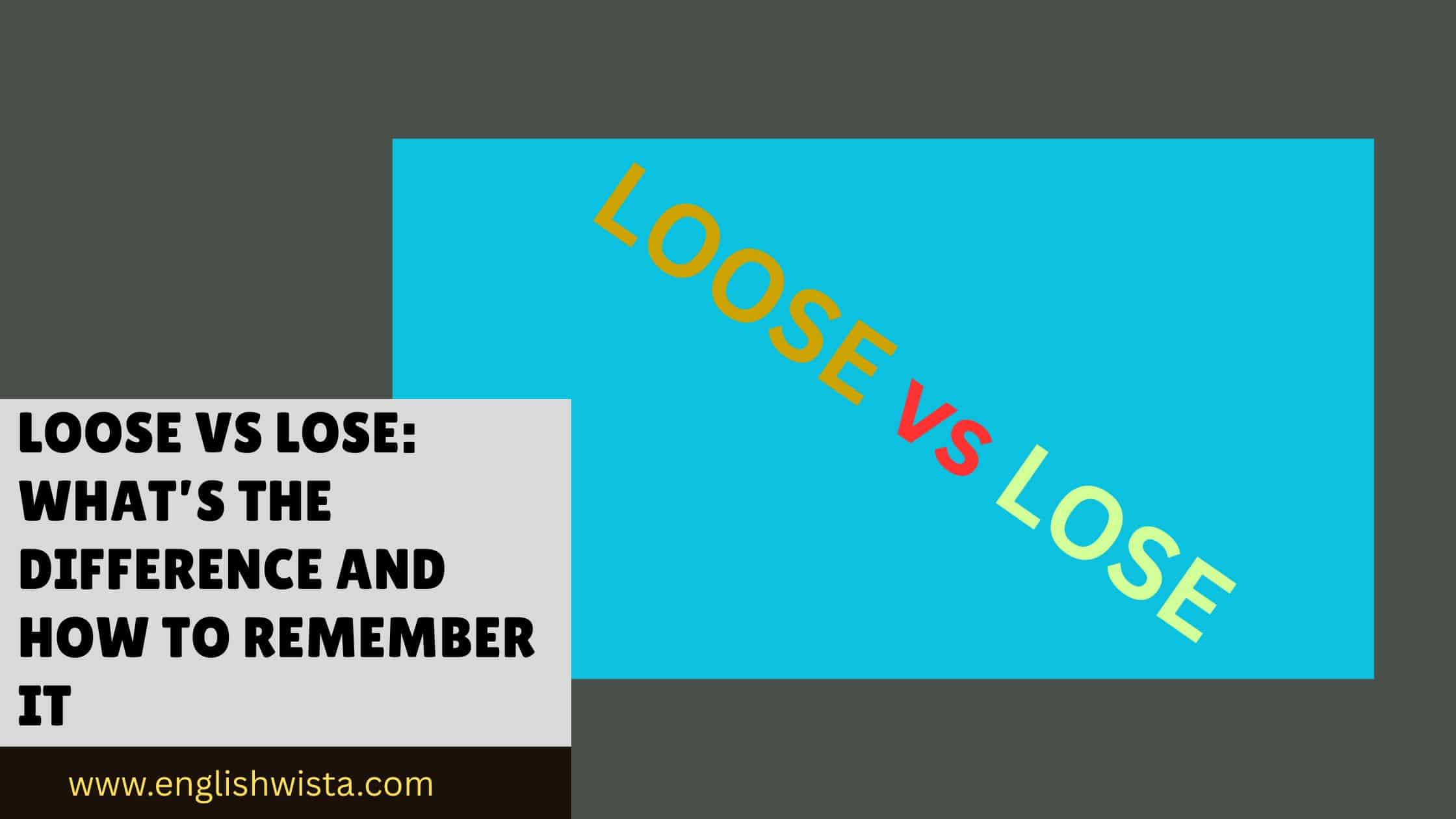Have you ever stared at your phone while typing and suddenly wondered: “Wait… is it loose or lose?” Don’t worry you’re not alone! This is one of the most common mix-ups in English. Both words sound somewhat similar, both have double “o,” and both are short. But they actually mean very different things, and mixing them up can confuse your message.
The good news? Once you understand the difference, it’s easy to keep them straight. In this article, we’ll break down loose vs. lose in simple steps, with plenty of examples, tips, and fun facts along the way. By the end, you’ll feel confident knowing when to use which word.
What Does “Loose” Mean?
Let’s start with loose.
Definition: Loose is an adjective, which means it describes something. It means “not tight,” “not firmly fixed,” or “free.”
Think of it as the opposite of tight. If your shoelaces are not tied properly, they’re loose. If your pants are too big, they’re loose.
Examples of “loose” in sentences:
- My jeans are too loose, so I need a belt.
- The dog got loose from its leash.
- Don’t leave any loose wires hanging from the wall.
- She wore her hair loose over her shoulders.
So whenever you want to talk about something that isn’t tight, fixed, or held firmly, loose is the word you need.
What Does “Lose” Mean?
Now let’s look at lose.
Definition: Lose is a verb, which means it describes an action. It means “to not win,” “to misplace something,” or “to fail to keep something.”
If you can’t find your keys, you lose them. If your team doesn’t win, they lose the game.
Examples of “lose” in sentences:
- Be careful not to lose your phone.
- If we don’t try harder, we’ll lose the match.
- Don’t lose hope it’s going to be okay.
- He didn’t want to lose his chance to speak.
So whenever you’re talking about failing to win, misplacing something, or no longer having something, you should use lose.
The Big Difference Between “Loose” and “Lose”
Here’s the simplest way to see the difference:
- Loose = not tight (adjective).
- Lose = not win / misplace (verb).
They don’t just have different meanings they also sound different.
Pronunciation tip:
- Loose rhymes with “moose.”
- Lose rhymes with “choose.”
It might feel tricky at first, but if you say them out loud a few times, your ears will start to catch the difference.
Why Do People Confuse “Loose” and “Lose”?
Great question! People often mix these two up because:
- Spelling similarity – They both have “oo” in the middle, so they look alike.
- Typing errors – When typing fast, it’s easy to accidentally add or drop an “o.”
- Sound confusion – In casual speech, they can sound almost alike to some ears, especially for non-native speakers.
But remember: one is an adjective (loose), and the other is a verb (lose). That’s the main way to separate them in your mind.
Fun Trick to Remember the Difference
Here are some simple memory hacks to help you:
- Loose has two “o’s” → think of “too loose.” Double “o” = extra room, not tight.
- Lose has one “o” → think of “one chance.” You get one “o” because you don’t want to lose more!
Another way to remember:
- If it describes how something feels (not tight, free, baggy), it’s loose.
- If it describes something you do (misplace, fail to win), it’s lose.
Real-Life Examples to Compare
Sometimes the best way to learn is to see both words side by side. Let’s check a few examples:
- Loose vs. Lose in clothing:
- My shoes are loose (they don’t fit tightly).
- Don’t lose your shoes (don’t misplace them).
- Loose vs. Lose in sports:
- The basketball is loose on the court (not held by anyone).
- We might lose the basketball game (not win).
- Loose vs. Lose in daily life:
- There’s a loose screw on this chair.
- Don’t lose the screwdriver.
Notice how in each case, loose describes a state, while lose describes an action.
Common Phrases with “Loose”
The word loose shows up in lots of common sayings:
- Cut loose – to relax or let go.
Example: It’s Friday night, let’s cut loose and have some fun. - At loose ends – not busy or unsure what to do.
Example: After finishing the project, I felt at loose ends. - Play fast and loose – to act recklessly or dishonestly.
Example: He plays fast and loose with the rules.
Common Phrases with “Lose”
You’ll also see lose in popular phrases:
- Lose track – forget or stop following something.
Example: I always lose track of time when I’m reading. - Lose your mind – become extremely upset or act crazy.
Example: She’ll lose her mind if she hears this news. - Lose touch – stop communicating.
Example: We lost touch after high school. - Lose face – lose respect or dignity.
Example: He didn’t want to lose face in front of his colleagues.
A Quick History: Where Do These Words Come From?
A little history makes words easier to remember.
- Loose comes from Old Norse and Old English roots meaning “free” or “not bound.”
- Lose comes from Old English losian, which meant “to perish” or “to be destroyed.”
So even in their origins, loose was about freedom and lose was about failure or disappearance.
Common Mistakes to Avoid
Here are some classic errors to watch for:
- ❌ Don’t write I don’t want to loose the game.
✅ Correct: I don’t want to lose the game. - ❌ Don’t write My shoelaces are lose.
✅ Correct: My shoelaces are loose. - ❌ Don’t write She will loose her phone if she’s not careful.
✅ Correct: She will lose her phone if she’s not careful.
Remember: if it’s about misplacing or not winning, it’s always lose.
Extra Fun Fact
Did you know? The phrase “loose cannon” comes from the days of sailing ships. Cannons that weren’t tied down could roll dangerously across the deck when the ship moved. That’s why today we call an unpredictable person a “loose cannon.”
Quick Recap
Before we wrap up, let’s do a super-quick summary:
- Loose = adjective, means not tight or not fixed. (Shoes, clothes, hair, wires.)
- Lose = verb, means to misplace, fail to win, or stop having something. (Games, items, opportunities.)
- Loose rhymes with moose.
- Lose rhymes with choose.
- Easy trick: Loose has double “o” (extra room). Lose has single “o” (don’t lose more).
Conclusion
So there you have it the full scoop on loose vs. lose! At first glance, they might look like tricky twins, but once you slow down and think about their meanings, they’re actually pretty easy to tell apart. Just remember: loose describes things that aren’t tight, and lose describes when you don’t win or can’t find something.
Next time you’re writing a message, an email, or even a social media post, pause for just a second and ask yourself: “Am I describing something not tight or am I talking about not winning?” That one question will almost always guide you to the right choice.
And here’s the best part you won’t lose confidence anymore when it comes to using loose and lose!



